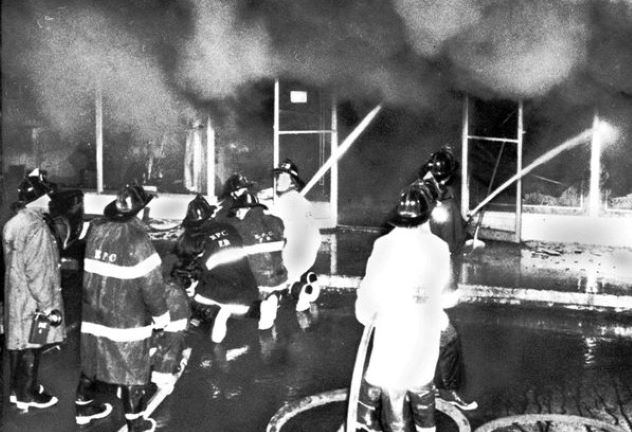 History
History  History
History  Weird Stuff
Weird Stuff 10 Wacky Conspiracy Theories You Will Need to Sit Down For
 Movies and TV
Movies and TV 10 Weird Ways That TV Shows Were Censored
 Our World
Our World 10 Places with Geological Features That Shouldn’t Exist
 Crime
Crime 10 Dark Details of the “Bodies in the Barrels” Murders
 Animals
Animals The Animal Kingdom’s 10 Greatest Dance Moves
 Movies and TV
Movies and TV 10 Box Office Bombs That We Should Have Predicted in 2025
 History
History 10 Extreme Laws That Tried to Engineer Society
 History
History 10 “Modern” Problems with Surprising Historical Analogs
 Health
Health 10 Everyday Activities That Secretly Alter Consciousness
 History
History 10 Dirty Government Secrets Revealed by Declassified Files
 Weird Stuff
Weird Stuff 10 Wacky Conspiracy Theories You Will Need to Sit Down For
 Movies and TV
Movies and TV 10 Weird Ways That TV Shows Were Censored
Who's Behind Listverse?

Jamie Frater
Head Editor
Jamie founded Listverse due to an insatiable desire to share fascinating, obscure, and bizarre facts. He has been a guest speaker on numerous national radio and television stations and is a five time published author.
More About Us Our World
Our World 10 Places with Geological Features That Shouldn’t Exist
 Crime
Crime 10 Dark Details of the “Bodies in the Barrels” Murders
 Animals
Animals The Animal Kingdom’s 10 Greatest Dance Moves
 Movies and TV
Movies and TV 10 Box Office Bombs That We Should Have Predicted in 2025
 History
History 10 Extreme Laws That Tried to Engineer Society
 History
History 10 “Modern” Problems with Surprising Historical Analogs
 Health
Health 10 Everyday Activities That Secretly Alter Consciousness
10 Unexpected and Deadly Arsonists
Fire is a powerful element that the human species has long manipulated. We use it for cooking, warmth, and light, among many other things. It has been a lifeline in the ever-changing world. However, what happens when a rare few no longer use fire as a helpful tool but instead use it as a deadly force?
With a myriad of motives, from revenge and money to excitement and concealing another crime, arsonists tend to fit a specific profile. While not inclusive of all arsonists, they are generally unmarried white males between 17 and 26. They tend to be socially awkward or isolated, average to highly intelligent, unemployed or holding low-wage, non-professional jobs, and have a history of mental illness and alcohol or substance abuse.[1]
Of course, there are exceptions, as noted in this list, making these people 10 of the most unexpected—and deadly—arsonists.
Related: 10 Gruesome Murders By Fire
10 Julio Gonzalez
Julio Gonzalez, a 35-year-old Cuban man, was responsible for the arson of Happy Land Social Club in the Bronx, New York, resulting in the deaths of 87 people. Even though the venue was deemed an illegal club, having received a number of code violations and an order to close, it was still a popular place in the neighborhood. In addition, the club had no valid state liquor license and had been called a terrible fire hazard.
On March 25, 1990, Gonzalez, recently laid off from his job at a warehouse, was intoxicated and looking for his ex-girlfriend, who worked at the social club. When Gonzalez’s girlfriend refused to come with him, the couple had a fight resulting in the bouncer throwing him out. He walked across the street to an Amico station and found an empty 1-gallon container. He purchased $1 worth of gas then walked back to the nightclub. He doused the staircase of the building in gasoline, ignited the fire, then walked home and fell asleep.
Most of the victims of this crime died by suffocation from smoke inhalation or were trampled to death trying to escape. Gonzalez’s girlfriend happened to be one of only six survivors. After confessing about her fight with her boyfriend prior to the fire, cops tracked down and arrested Gonzalez. On September 19, 1991, he was convicted on 174 counts of depraved indifference to human life and felony murder—two for each death—plus two counts for first-degree arson and first-degree assault. He received the maximum sentence of 25 years to life in prison. Gonzalez died in prison of natural causes in 2016 at age 61. At the time of the fire, it was labeled as the worst mass murder in U.S. history.[2]
9 Terry Barton
On July 18, 2002, Terry Barton was working her shift as a forest service worker and fire spotter when she recalled smelling fire. She then reported a fire had started in a campground northwest of Lake George. Ultimately, the fire burned 138,000 acres of land. It destroyed 113 homes, becoming the largest fire in Colorado state history at the time. By the end of the ordeal, nearly 5,000 people had fled for their lives, with one person dying due to smoke inhalation complications.
Upon investigation, officials discovered the fire ring where the fire had been started. Due to the very hot weather at the time and matches left at the scene, investigators went from believing a simple bonfire grew out of hand to realizing that this was an intentional act of arson. A week after the fire and upon further investigation, Barton, a woman in her late thirties, admitted she was the one who had started the fire.
Investigators believe she started it to seek attention but then was unable to extinguish it as it grew rapidly out of control. Barton was sentenced to six years in federal prison. Colorado state then sentenced her to 12 more years to run concurrently with her previous sentence. She is still on probation to this day and is also making payments for the damage she caused, still owing tens of millions of dollars in restitution.[3]
8 Paul Keller
Paul Keller is a serial arsonist and convicted murderer from Washington state. He had one of the longest arson sprees in American history. For six months in late 1992 and early 1993, Keller set 76 fires, resulting in over $30 million worth of property damage. He even set some of his fires in Lutheran churches—a fact that would later be noteworthy as he was raised in a devout Lutheran family. He always started these fires without using an accelerant, instead opting to set fire to the exterior of a building.
On September 22, 1992, Keller lit a fire in a Seattle retirement home, killing three residents. Eventually, investigators were able to create a profile of the supposed arsonist along with a composite sketch. Keller’s father recognized the profile and contacted the police, providing details about his son’s life. Keller was 27, worked in the family’s advertising business, and was in the midst of a divorce. Eight days later, Keller was finally arrested. He was convicted of intentionally setting 107 fires and ultimately confessed to 76 of them. Keller was sentenced to 99 years in prison and will be eligible for parole in 2079.[4]
7 Johanna Lopez
In 2017, the LA district attorney announced three arrests in connection with the 1999 arson of a Los Angeles apartment complex. At the time of the fire, Johanna Lopez had been paying members of the 18th Street gang for the rights to sell drugs in a section of Westlake. One day, she had an argument with her apartment manager regarding drug distribution, which ultimately resulted in Lopez recruiting two gang members to intervene.
The apartment manager was later moving furniture when suddenly a mattress in the hallway was set on fire. The flames quickly grew, engulfing the second floor and spreading across the complex. In the end, the fire claimed the lives of three women and seven children. More than a hundred residents became displaced, and 40 people were injured.
Witnesses were too afraid of speaking out against the gang, which made evidence harder to obtain. However, after years, some witnesses felt comfortable enough to testify. Lopez was arrested in 2011 and remained in police custody on another charger when she was re-arrested for this new crime. She finally pled guilty to two counts of manslaughter in early 2020. In addition, murder charges were brought against her two male accomplices in 2017. For her role in one of the worst fires that her city has ever seen, Lopez was sentenced to 22 years in a California state prison.[5]
6 Thomas Sweatt
In 2003 and 2004, an arsonist in the DC area went on a fire-starting spree. Thomas Sweatt, a restaurant manager, would later be known as DC’s worst serial arsonist, responsible for several fatal arson cases spanning nearly thirty years. In 1989, when walking home from work, Sweatt stumbled upon a man he found attractive, so he followed him home. After walking back to his own home, Sweatt wanted to see the man again, so he drove to a gas station, filled a two-liter soda bottle full of gasoline, and returned to the man’s home. He lit the fire and watched from his car. Instead of speaking with the man, he thought arson would be better.
In the fire, the man’s wife, unfortunately, succumbed to the overwhelming flames. A few days later, on March 5, the man, too, died from his injuries. This fire was classified as an accident thought to have started from a cigarette and only later became an arson case after Sweatt confessed during his arrest for other fires.
Surprisingly, Sweatt got away with setting hundreds of fires throughout his life. However, a break in the case led the two-year investigation to Sweatt. Altogether, his fire setting caused the death of four people and very significant property damage. After his initial arrest in 2005, Sweatt, then 50, confessed to an additional 300 fires. He pled guilty to setting 45 fires, receiving life imprisonment without parole.[6]
5 Peter J Leonard

On June 30, 1974, a small-time thief named Peter Leonard burglarized a bowling alley that was adjacent to Gulliver’s nightclub/restaurant. He was just 22 years old at the time and was attempting to cover up the petty crime. He set fire to the cigarette machines inside the bowling alley that he had just broken into and fled.
The fire grew, quickly consuming the nightclub next door. Gulliver’s was full of young people enjoying a concert by the band The Creation—whose drummer, Eric Carr, would later join the legendary rock band Kiss. While Carr survived, several of his bandmates perished. It took hours for firefighters to finally gain control of it. Many people stuck inside died in the staircase area, unable to escape.
The fire ultimately killed 24 people, also injuring 19 patrons and 13 firemen. Two weeks after the fire, Leonard, a 10th-grade high school dropout, was arrested. While awaiting trial, Leonard also set the mattress in his jail cell on fire. Eventually, he pled guilty to burglary, arson, and felony murder in 1975, and after many court cases and appeals, he took a deal and was sentenced to 15 years in prison.[7]
4 John “Pillow Pyro” Orr
John Orr is a former fire captain and arson investigator who was actually a secretive arsonist responsible for mass murder. Residing in California, Orr was dubbed the “Pillow Pyro” for his habit of targeting linen shops and for the fire’s location inside the store. He also often used an incendiary timing device (a cigarette with a rubber band wrapped around the end wedged into a matchbook.)
Orr made sure to always start his fires in populated stores. Originally, he wanted to be a cop but failed the entry exam, opting instead to become a firefighter. Through the ’80s and ’90s, Los Angeles was plagued with fires, causing millions of dollars worth of damage. Then, in 1984, a fire broke out at a Home Center Hardware store in a shopping plaza, and four people died as a result of the fire, two of them children. The fire was determined to be an electrical fire; however, Orr happened to be one of the investigators helping to determine the cause.
Through a surprising set of circumstances—a partial fingerprint, a gathering of fire experts, and an unpublished novel—Orr was later found to be the culprit of all these fires that seemed to shroud the LA area. On July 31, 1992, Orr was convicted of three counts of arson while the jury acquitted him of two other counts. Ultimately Orr was sentenced to thirty years in federal prison. He also faced charges in California for murder. In 1998, a jury found him guilty of four counts of murder; he received four consecutive life sentences, plus 21 years for arson. He remains incarcerated, unlikely to ever leave prison. While not that common, surprisingly, firefighters do make up a small percentage of arsonists.[8]
3 Cameron Todd Willingham
Cameron Todd Willingham was a very controversial case of arson that still has people defending or denouncing the outcome to this day. A young married father, Willingham was convicted of murdering his three young daughters by a fire that started in the family home on December 23, 1991. His wife was out shopping for Christmas presents at the time, and his children were asleep. Willingham escaped the fire with minor injuries.
Fire investigators believed the fire was arson, noting an accelerant was possibly used. During his trial, two sides started to form. Those who believed Willingham was innocent and those who believed he had started the fire purposely. Prosecutors argued he started the fire to hide evidence of child abuse, pointing to his history of domestic violence, though there was never any record of him abusing his children. Most of the evidence against him was also later changed or recanted.
However, the most powerful testimony came from his cellmate at the time, who claimed Willingham had confessed to starting the fire to cover up child abuse at the hands of the children’s mother. His cellmate later recanted his statement saying he was coerced into a false statement by the prosecutor (which resulted in another case altogether). Despite his defense and protests of his innocence, Willingham was handed down the death penalty. On February 17, 2004, he was executed by the state of Texas.[9]
2 Shirley Winters

The case of Shirley Winters is bizarre and unusual. She is considered a very dangerous pyromaniac and is a convicted serial killer. When Shirley was 18, she married Robert Winters Jr. Two years into their marriage, the couple’s two children died in a house fire while Shirley claimed she was watching TV. Her husband was working at the time.
The day before the death of her own kids, three other children died in a separate house fire 50 miles away. The mother of the children was a friend of Shirley’s. After the fires, Shirley and her husband separated. Then, on November 21, 1980, her youngest child, only 5 months old, died mysteriously in a trailer. In 1989, she went on trial for another arson from earlier that year, but the jury was deadlocked in their decision, and the second trial later acquitted her. She would go on to set eight more fires and also give birth to another son and daughter.
In 2007, a grand jury indicted her on a charge of murdering her five-month-old son in 1980. Six months later, she was indicted on a murder charge from 2006 in the drowning of her two-year-old. Three days later, she pleaded guilty to first-degree manslaughter in her infant son Ronald’s death. A St. Lawrence County judge sentenced her to 20 years in prison. At the time, she was also under investigation for the 1979 deaths of her two oldest children and the death of her friend’s three children, but her plea ultimately ended those arson murder investigations.[10]
1 Kyle Alwood
On an April night in 2019, Kyle Alwood was only eight years old when he started a house fire that killed five of his relatives. In the fire, his half-siblings—Daemeon Wall, 2, and Ariel Wall, 1—and his stepfather Jason Wall, 34, all perished. His grandmother Kathryn Murphy, 69, and his cousin Rose Alwood, age 2, also couldn’t escape the flames. Kyle and his mother were the only people in the house who made it out alive.
His mother claimed after the fire that the boy had many mental health diagnoses such as schizophrenia, ADHD, and bipolar disorder, admitting that he accidentally set the fire. Prosecutors believed the fire was no accident and had been deliberately set by the young boy. Due to his young age, he couldn’t be held in custody. Instead, he’s currently living with foster guardians related to his father.
More details of the circumstances regarding the fire are still being investigated. In July 2020, Alwood, facing five counts of murder, was deemed unfit to stand trial. Even if charges are later brought, they cannot result in incarceration due to the boy’s age. Monitoring and assessment of Alwood continue, yet the results would only lead to therapy, counseling, and psychological evaluation to monitor the child’s state of mind, plus probation that could not extend past his 21st birthday.[11]








